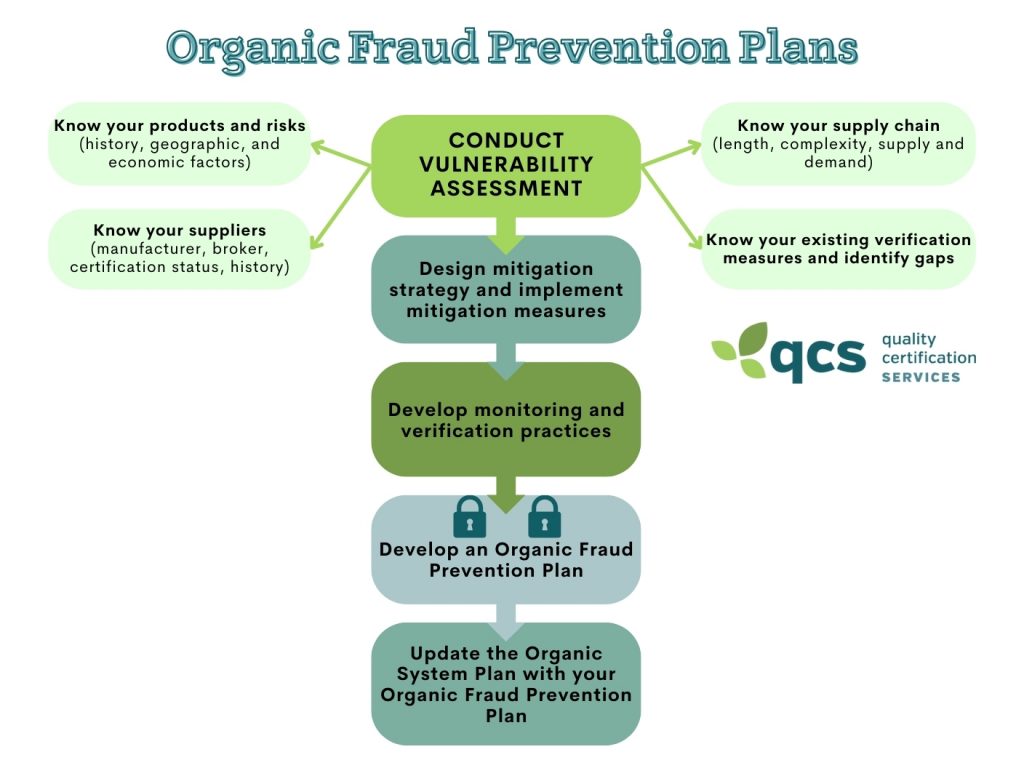
Under the National Organic Program’s Strengthening Organic Enforcement rule change (March 19, 2024), every certified operation is required to have procedures dedicated to preventing fraud outlined in their Organic System Plan (OSP). Our team is dedicated to providing you with resources to understand the organic regulations. Learn more below about the requirements regarding fraud prevention plans.
The Organic Regulations define Organic Fraud as Deceptive representation, sale, or labeling of nonorganic agricultural products or ingredients as “100 percent organic,” “organic,” or “made with organic (specified ingredients or food group(s)).”
An Organic Fraud Prevention Plan (or OFPP) is the plan that producers and handlers design as part of their Organic System Plan to outline the vulnerabilities and mitigation strategies for preventing organic fraud in their supply chain.
QCS’ Organic Grower Plan (OGP Section 11 (a) (3)), Organic Livestock Plan (OLP Section 1 (c) (4)) and the Organic Handling Plan (OHP Section 4 (e) (3)) address fraud prevention for each specific scope. The purpose of an OFPP is to document how an operation ensures only compliant suppliers and organic products are used and details the steps taken to prevent instances of organic fraud. The plan must evaluate all certified organic items (products, ingredients, livestock, etc.) that are purchased or brought onto the operation. It also must describe how the suppliers are verified as being compliant, as well as how the actual products are verified to retain their organic status from the supplier to the operation.
At a fundamental level, the components of an OFPP should start with a vulnerability assessment of your particular supply chain. The assessment is conducted to identify where in your supply chain fraud could occur. Once these critical control points have been identified, the next step is to create a plan to mitigate or eliminate those areas where fraud could occur. The mitigation plan should include a plan to monitor and evaluate the effectiveness of the mitigation practices. These procedures should include the frequency with which the plan is performed. Finally, update your organic system plan to include OFPP.

According to § 205.201(a)(3) Organic Production and Handling System Plan:
“A description of the monitoring practices and procedures to be performed and maintained, including the frequency with which they will be performed, to verify that the plan is effectively implemented. This must include a description of the monitoring practices and procedures to verify suppliers in the supply chain and organic status of agricultural products received, and to prevent organic fraud, as appropriate to the certified operation’s activities, scope, and complexity.”
Mitigation Measure: Measure taken to decrease vulnerability to organic fraud in a given supply chain.
Mitigation Strategy: Selected set of mitigation measures aimed at preventing food fraud in a given supply chain that are incorporated into the Organic Fraud Prevention Plan.
Organic Critical Control Points (OCCP): A step or procedure at which controls can be applied to prevent the organic integrity of an organic ingredient or product being compromised Control points are essential components of an Organic System Plan, and identify the places in a product process flow or in the supply chain where the organic integrity of a product could be compromised.
Organic Fraud: Deceptive representation, sale, or labeling of nonorganic agricultural products or ingredients as “100 percent organic,” “organic,” or “made with organic (specified ingredients or food group(s)).”
Organic Fraud Prevention Plan: A company plan that documents the vulnerability assessment, mitigation measures and verification procedures that will be performed and maintained to verify that the plan is effectively implemented.
Organic System Plan: A plan of management of an organic production or handling operation that has been agreed to by the producer or handler and the certifying agent, and that includes written plans concerning all aspects of agricultural production or handling described in Title 7 CFR 205 (National Organic Program Regulations).
Risk: The potential for loss, damage or destruction of an asset as a result of a threat exploiting a vulnerability. Risk is the intersection of assets, threats, and vulnerabilities.
Vulnerability Assessment (or Vulnerability Characterization):
Within a food fraud management system, the step aimed at reviewing and assessing various factors that create vulnerabilities in a supply chain (i.e., weak points where fraud has greater chances to occur) .
Note: A vulnerability is a weakness or gap in protection efforts.
Reach out at qcs@qcsinfo.org, and we'll send the answer straight to your inbox! You can also call us at (352) 377-0133. Or, visit the Apply tab to schedule a free 1-on-1 call with our specialists.
